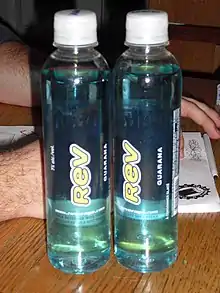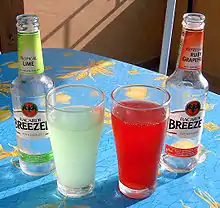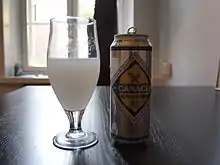Alcopop
An alcopop (or cooler, spirit cooler in South African English, or malternative in America) is any of certain flavored alcoholic beverages with relatively low alcohol content (e.g., 3–7% alcohol by volume), including:
- Malt beverages to which various fruit juices or other flavorings have been added
- Beverages containing wine to which ingredients such as fruit juice or other flavorings have been added (wine coolers)
- Beverages containing distilled alcohol and sweet liquids such as fruit juices or other flavourings[1]

The term alcopop (a portmanteau of the words alcohol and pop) is used commonly in the United Kingdom to describe these drinks.[2] Other terms include FAB (flavored alcoholic beverage), FMB (flavored malt beverage),[3] PPS (pre-packaged spirit or premium packaged spirits), and RTD (ready-to-drink – Australia and New Zealand).
Description
There are a variety of beverages produced and marketed around the world as well as within each market which are described as coolers or alcopops. They tend to be sweet and served in small bottles (typically 355 ml (the normal size of a soda pop can) in the US, 275 ml in South Africa and Germany, 330 ml in Canada and Europe), and between 4% and 7% ABV. In Europe, Canada, and South Africa coolers tend to be pre-mixed spirits, including vodka (e.g. Smirnoff Ice) or rum (e.g. Bacardi Breezer). In the United States, on the other hand, alcopops often start out as un-hopped beers, depending on the state in which they are sold. Much of the malt (and alcohol) is removed (leaving mostly water), with subsequent addition of alcohol (usually vodka or grain alcohol), sugar, coloring and flavoring. Such drinks are legally classified as beers in virtually all states and can therefore be sold in outlets that do not or cannot carry spirit-based drinks. There are, however, stronger ones that are simply pre-mixed spirits (e.g. Bacardi Rum Island Iced Tea), often containing about 12.5% alcohol by volume, that can be sold only where hard liquor is available.
In the United States there is a proportionally limited tax on alcopops relative to those sold in Europe, although some states are considering legislation to bring their tax levels closer to the European model, which is credited with limiting consumption by youth.
According to the US Alcohol and Tobacco Tax and Trade Bureau (TTB):
Flavored malt beverages are brewery products that differ from traditional malt beverages such as beer, ale, lager, porter, stout, or malt liquor in several respects. Flavored malt beverages exhibit little or no traditional beer or malt beverage character. Their flavor is derived primarily from added flavors rather than from malt and other materials used in fermentation. At the same time, flavored malt beverages are marketed in traditional beer-type bottles and cans and distributed to the alcohol beverage market through beer and malt beverage wholesalers, and their alcohol content is similar to other malt beverages in the 4-6% alcohol by volume range.
Although flavored malt beverages are produced at breweries, their method of production differs significantly from the production of other malt beverages and beer. In producing flavored malt beverages, brewers brew a fermented base of beer from malt and other brewing materials. Brewers then treat this base using a variety of processes in order to remove malt beverage character from the base. For example, they remove the color, bitterness, and taste generally associated with beer, ale, porter, stout, and other malt beverages. This leaves a base product to which brewers add various flavors, which typically contain distilled spirits, to achieve the desired taste profile and alcohol level.
While the alcohol content of flavored malt beverages is similar to that of most traditional malt beverages, the alcohol in many of them is derived primarily from the distilled spirits component of the added flavors rather than from fermentation.
- —70 Fed. Reg. 194 et seq. (January 3, 2005)[3]
In some Continental European countries, such as Austria and Germany, bottled beer cocktails and shandies are available, which are being marketed the same way like alcopops. However, these beverages are based on traditional hopped beers and therefore not considered to be alcopops.
History

Wine coolers gained popularity in the US market in the 1980s when Bartles and Jaymes began advertising their brand of wine coolers, which were followed by other brands, including when Bacardi introduced the Breezer.[4] A growth in popularity occurred around 1993 with Two Dogs, DNA Alcoholic Spring Water, Hooper's Hooch and Zima, which was marketed under the title of "malternative beverage." Wine coolers were on the decline due to the increase in the US federal wine tax, and using a malt-beverage base became the new industry standard. Later, Mike's Hard Lemonade was released in the United States, with humorous commercials depicting what they called "violence against lemons". Smirnoff also came out with another citrus-flavored malt beverage in the United States in the late 1990s called Smirnoff Ice, which promoted itself with flashy commercials, usually involving trendy young people dancing in unlikely situations and places. (In the UK, Smirnoff Ice is marketed by Diageo as a PPS.)
Through its Alcopop-Free Zone® campaign, "[5] Alcohol Justice has sought to ban alcopop sales entirely since the sweet and brightly colored alcoholic drinks may appeal to children. Many cooler advertising campaigns have been criticized as trying to make alcopops appeal to young drinkers. In the United Kingdom, a media outcry during the mid-1990s arose as the tabloid press associated alcopops with under-age drinking which damaged sales and led to British liquor stores withdrawing them from their shelves.
In response to a complaint from the Center for Science in the Public Interest (CSPI), the Federal Trade Commission (FTC) conducted an extensive investigation in 2001. The agency "found no evidence of intent to target minors with FMB products, packaging, or advertising. Furthermore, after reviewing the consumer survey evidence submitted by CSPI in support of the proposition that FMBs were predominantly popular with minors, the FTC concluded that flaws in the survey's methodology limited the ability to draw conclusions from the survey data."
The Federal Trade Commission again in 2003 investigated FMB ads, product placement, and internal company marketing documents after a directive from the conferees of the House and Senate Appropriations Committees. "The Commission's investigation found no evidence of targeting underage consumers in the marketing of FMBs. Adults 21 to 29 appear to be the intended target of FMB marketing"[6] and found that "the majority of FMB drinkers are over the age of 27."[7]
In December 2003, Ireland raised the tax on flavored malt beverages to equal that of spirits, the second-highest in Europe. Germany has imposed an extra duty of 0.80 to 0.90 euro per bottle effective August 1, 2004. To circumvent higher taxation, some German producers have switched to wine coolers, which are being marketed the same way. Some bottles now carry a warning stating that they are not for consumption by people under the legal drinking age (under 18 in the UK and 21 in the United States). On May 11, 2008, the Australian Government increased the excise tax on alcopops by 70%, to bring it in line with the tax on spirits. There is the concern this tax will encourage consumers to buy straight spirits and mix the drinks themselves,[8] possibly resulting in drinks with a higher alcohol concentration than the premixed alternatives. This tax was revoked during March 2009 meaning the government had to pay back the 290 million collected on the tax.[9]
The Federal Trade Commission report states, "Further, industry-conducted research on consumers over the age of 21 who use FMBs shows that these consumers generally view the FMBs as substitutes for beer, ... This research also concludes that consumers are not likely to consume more than two or three FMBs on any occasion because of the products' sweetness.[7]
In March 2018, Coca-Cola announced it would be launching an alcopop product for the first time, a chūhai beverage in Japan.[10]
Brands

Brands of coolers are numerous and their alcoholic base vary greatly.[11] Some notable brands include: VK Vodkakick, Smirnoff Ice, Mike's Hard Lemonade, Bacardi Breezer, Palm Bay, Skyy Blue, Jack Daniel's Hard Cola and in the UK WKD Original Vodka.
Attempts to discourage
Australia
The Australian government increased the tax on these drinks under the 2008 budget to the same rate as spirits, volumetrically, in an effort to stop binge drinking. The tax was criticized by the opposition as a tax grab, and voted down in the Senate on March 18, 2009.[12] Before its rejection, the tax had already raised at least A$290 million after April 2008.[13] In April 2009, some Labor party MPs planned to resubmit the tax to the Senate,[13] and it was finally approved in August 2009, increasing the tax on the drinks from $39.36 to $66.67 per litre of alcohol.[14] A 2013 study concluded that the tax had no impact on binge drinking of the drinks by teenagers.[15]
Germany
On 1 July 2004 the German government increased the tax on mixed drinks based on spirits (e.g. vodka, rum) by roughly one Euro per 275-ml-bottle in order to discourage teenagers drinking excessively, although those drinks were already prohibited for those under the age of 18. This had two implications: The most common alcopops, such as Smirnoff Ice or Bacardi Breezer, were nearly taken off the market, while other manufacturers changed the recipes of their drinks to replace spirit alcohols with wine or beer, but with the same ABV, enabling these mixed drinks (which are not "alcopops" under German law) to be sold legally to minors 16 and 17 years of age.
Philippines
In 2019, some senators including Pia Cayetano and former Special Assistant to the President Bong Go called for pullout of alcopops from the market due to "deceptive packaging that resembles fruit juices usually bought by young consumers". Alcopops also have seven percent alcohol content, which is slightly lower than that of local beer brand Red Horse Beer.[16][17]
South Africa
In South Africa, "spirit coolers" cannot be sold to persons under the age of 18. They are only sold at liquor stores.
United Kingdom
In June 1997, Co-op Food became the first major retailer to place an outright ban on the sale of alcopops in its shops.[18] This has since been rescinded.
See also
References
- SB1625, Illinois General Assembly 1977 Archived 2008-12-05 at the Wayback Machine (Amendment to The Liquor Control Act of 1934, Section 6-35; 235 ILCS 5/6-35)
- "Archived copy" (PDF). Archived from the original (PDF) on 2008-05-11. Retrieved 2008-09-28.CS1 maint: archived copy as title (link)
- "California Board of Equalization. Flavored Malt Beverages, 2005" (PDF).
- "Age Checker | Distell". www.distell.co.za.
- Alcopops: Sweet, Cheap, and Dangerous to Youth. San Rafael, CA
- Federal Trade Commission. Alcohol Marketing and Advertising: A Report to Congress. Washington, DC: Federal Trade Commission, 2003. p. 22
- Alcohol Marketing and Advertising: A Report to Congress. Washington, DC: Federal Trade Commission, 2003. p. 5
- Jenkins, Melissa (2008-09-16). "Expert report backs alcopop tax hike". The Sydney Morning Herald. Retrieved 2020-02-01.
- McManus, Gerard (March 18, 2009). "Alcopops tax defeated in the Senate after second vote". Herald Sun. AAP.
- Lewis, Leo (March 6, 2018). "Coca-Cola to launch alcoholic drink in Japan". Financial Times. Archived from the original on March 7, 2018.
Coca-Cola is planning a break with 125 years to experiment with its first alcoholic drink as the world’s largest soft drinks company eyes Japan’s growing market for “Chu-Hi” alcopops.
- "Ready To Drink (RTD) Fact Sheet". Cocktail Times.
- Alcopops tax fails to pass Senate, Sydney Morning Herald, 18 March 2009.
- Government to try again with alcopops tax Archived 2009-04-18 at the Wayback Machine, news.com.au, 15 April 2009.
- "Australian Tax on Alcopops". Retrieved 3 September 2018.
- "'Alcopop' tax fails to deter teen binge drinking, raises $4.5 billion in revenue".
- "Pull out Alcopop drinks from grocery shelves, Bong Go urges". Manila Bulletin News.
- Rivas, Ralf. "LOOK: Senators take a sip of alcopops during alcohol tax hearing". Rappler.
- Cope, Nigel (13 June 1997). "Co-op places ban on alcopops". The Independent. Retrieved 27 November 2017.
- Sources
- Bloomberg News, FTC Says Alcohol Type Not Aimed at Minors, Los Angeles Times, June 5, 2002.
- Melillo, W. FTC: Ads for 'Alcopops' Not Aimed at Teens, Adweek, June 6, 2002.
- American Medical Association, AMA Says Alcohol Industry Targets Teen Girls, December 16, 2004.
- California boosts tax on 'alcopops', Associated Press, August 15, 2007.
External links
- Portman Group (a UK alcoholic beverage industry trade advocacy group with a code of marketing practices)
- New wave of 'sophisticated' alcopops fuels teenage binge drinking The Guardian, 14 December 2002
- The demonised drink: How has youth drinking evolved 20 years since the launch of alcopops? The Independent, 29 June 2013
- The quiet death of the alcopop BBC News Magazine, 31 July 2013
- Alcopops at Curlie